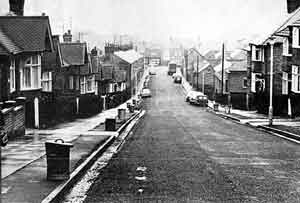|
Loading
|
|
|
From an interview with Michael O'Neill and Jeremy Seabrook

 Michael
O'Neill and Jeremy Seabrook have known each other since they were eleven when
they went to Northampton Grammar School. Jeremy Seabrook was born in Northampton
in 1939, Michael O'Neill in London in 1938. They both went to Cambridge and at
present Michael O'Neill teaches in a South London school and Jeremy Seabrook
works with educationally subnormal children and their parents. This is their
first performed play though they have been writing together since 1966.
Michael
O'Neill and Jeremy Seabrook have known each other since they were eleven when
they went to Northampton Grammar School. Jeremy Seabrook was born in Northampton
in 1939, Michael O'Neill in London in 1938. They both went to Cambridge and at
present Michael O'Neill teaches in a South London school and Jeremy Seabrook
works with educationally subnormal children and their parents. This is their
first performed play though they have been writing together since 1966.
We used to have our own drama society when we were about sixteen. We met in the Liberal Hall and read plays by all those names we knew were famous — Beckett, lonesco and the avant-garde and tried to get sets of them from the East Midland Library Loans Scheme.... But often we could only get a single copy of "Women of Twilight"!
I remember Jerry, wearing his mother's sandals and a long yellow robe and blackened from head to foot with cocoa, dashing up on the stage with fish and chips in his hands to play the murder scene in "Othello".
 Were
we active in university drama? You're joking. All the societies were filled with
such sophisticated, competent, thrusting people one couldn't compete with them
or cope with them. We weren't actors anyway. Were we happy there? No, almost
suicidal.... Not that that's unusual. Cambridge life is essentially social isn't
it? It didn't have any value that side of it for us. Jerry was worse off in a
sense than I was because his room was in an awful Gothic Edwardian block right
at the top of six flights of stairs. The only nice thing about it were the
defective flues and you could hear conversations relayed from remote corners of
the building.
Were
we active in university drama? You're joking. All the societies were filled with
such sophisticated, competent, thrusting people one couldn't compete with them
or cope with them. We weren't actors anyway. Were we happy there? No, almost
suicidal.... Not that that's unusual. Cambridge life is essentially social isn't
it? It didn't have any value that side of it for us. Jerry was worse off in a
sense than I was because his room was in an awful Gothic Edwardian block right
at the top of six flights of stairs. The only nice thing about it were the
defective flues and you could hear conversations relayed from remote corners of
the building.
We were completely and utterly passive there. I was completely passive until I was 21. It's quite interesting really.... We were manipulated at grammar school and at university. We put our fate into the hands of teachers and only after we left did we realise that they were no more trustworthy custodians of our fate than our parents. We didn't really become politically aware until we went down and Jerry went through a phase of being politically committed. Yes, there was this special woman who had a letter from Trotsky. She took me under her wing, she politised me and I was going to work for Radio Czechoslovakia. But I couldn't really think of anything else to do so I went back to Northampton and taught.
 When
Michael came back from teaching in America he worked in the first administration
for immigrants. But the whole thing was so badly organised. We were six months
behind, so labour vouchers were being given to people who didn't need to come in
and not to the more pressing cases. And neither the graduates in charge nor the
clerical workers knew how to deal with the difficult cases. And this is typical
in some ways of how the social services are run. It's not a failure of
administration so much as a lack of understanding in the people who are doing
the jobs.
When
Michael came back from teaching in America he worked in the first administration
for immigrants. But the whole thing was so badly organised. We were six months
behind, so labour vouchers were being given to people who didn't need to come in
and not to the more pressing cases. And neither the graduates in charge nor the
clerical workers knew how to deal with the difficult cases. And this is typical
in some ways of how the social services are run. It's not a failure of
administration so much as a lack of understanding in the people who are doing
the jobs.
You see, I don't think education sensitises people towards human problems. Although to be fair there are some teachers who attempt to bend it this way — I mean we might mention ourselves. But you're up against other people's opinions all the time. Most of the colleagues I've had in teaching regarded themselves as agents for social discipline fundamentally. They talk of "character building" but what they really mean is: "don't be a drain on the taxpayers' money, which means mine". Everything in our country is designed for people of a certain educational and economic level and there's a nasty attitude that says that people who fall below this level are wilful or something and it's morally reprehensible if you try and take welfare to their door, they're supposed to come and get it themselves. But of course if they do the right-wing press accuses them of "battening on the welfare".
But the families I work with couldn't batten if they tried. In 1 900 a mass of people were in poverty whether they could work or not whereas now people who get a reasonable job tend to be able to lift themselves out of this and so you're left with the residue, the inadequates, the failures, the mentally-sick and the sub-normals, and of course they are the ones who get to be the national scapegoats, who get stigmatised as feckless and parasites. And it's these people who need welfare who just don't know how to apply for it.
But, at least, working in special schools for educationally sub-normal children one can spot a problem which involves the whole family. Fortunately I've a great deal of freedom to do what I want with the families and can help them get their social security benefits, read them their possession order for their house, tell them how to get to court on the right day and how to pay their bills—that sort of thing. But even with this help social workers in the children's department tend to write off subnormals because they can't profit from case work. But they can. The help is just given in the wrong way. They expect them to appreciate the values of "cheap, healthy food and stout shoes". It's a reflection of the competitive ideology that welfare money should be spent on such "sensible" things.
Yes, this is very important. Our society assumes that shelter and bringing up a family are the most important things to every individual whereas the sub-normal would say, "I don't want my energies to be channelled into providing food, grubbing about getting housing and having cars to get from a to b and all this stuff. I want my energies to be released for more important and interesting things—like having a laugh, having a good time. "
They wouldn't get taxpayers' money for that of course but in fact there is enough money in welfare; it just doesn't get deflected into the right channels. For instance inadequate housing, which for goodness sake counts for about ten per cent of the population. After all, as we're in a competitive society you've got to concede that those at the bottom are not there through failure, they're there because of some kind of endowment over which they have no control. The society that has displaced the notion of hereditary station by one of merit is much more cruel. By heredity you can always say, "Well, I might have been born a princess, " but by merit there's no escape.
And even if the welfare authorities emphasised the "having a laugh" aspect more, the people we're dealing with wouldn't cope any better in society. It would just show in an addiction to Bingo. I know a woman who plays Bingo morning, noon and night and her family do suffer because she's never with them. And look at what is provided for their "bit of fun". Looking at the bits of stuff in Wooly's for Christmas one thinks "O. K., if it gives people delight to have these things shimmering in their parlours... " but when you think how bloody badly they're made.
They never have choice meaningfully presented to them. Right from a child they open their eyes and see a garish Christmas tree with sort of effigies of Englebert on top of it and plastic fairies with baubles round it. Right from the start they are conditioned to this acceptance of decor and surroundings. So what we're really fighting for is still the very basic things — the material goods, that's to say a reasonable amount of money to be able to eat well, I mean eat what they like, not necessarily what's good for them, and to be able to buy clothes they like.
Students aren't a political reality in this country because none of them are frustrated in finding jobs. When they stop being students they have easy, successful ways of being part of society. The student movement has this great sense of immediate catharsis, a great outflow of energy, but it's not identified with the important movements. They should disperse into the provinces and work from the inside of the system. There's no incentive to go into a probation office in Worksop, or into child care in Wigan and work from there.
There's been a lot of speeches by various spokesmen in the Conservative party recently saying there's been too much expansion of education in this country. What they really mean is that too many people have been educated to the theory of self-development.
We've got a nasty, creeping ideology nowadays, an attenuated version of the class struggle which shows itself in decisions like: "Shall we build a council estate twenty or thirty yards from the private estate. That's the sort of level it's on and that's why it's so paltry and petty and so futile and foul really. This is why developing countries are so much stronger because they've a sense of something important happening, like working for people to have enough to eat.